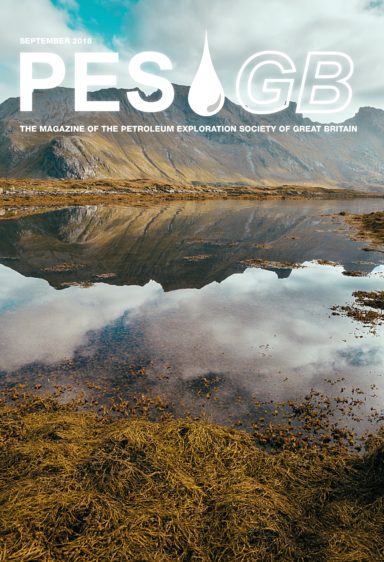PESGB September 2018
Plus much more inside

Somebody Else’s Problem?
We all love a three-letter acronym. My personal favourite is SEP, or “Somebody Else’s Problem”. This was first used as a comedic device by author Douglas Adams in his book “Life, the Universe and Everything”, where his otherworldly character Ford Prefect describes a SEP as “something we can’t see, or don’t see, or our brain doesn’t let us see, because we think it’s somebody else’s problem”.
The PESGB is sometimes criticised for avoiding some of the most sensitive and divisive areas in which our industry plays a significant role. The society is not a lobbying group, nor does it represent any particular corporate or personal perspective. It does have a public outreach role, however, and that is one objective we should take very seriously.
The science behind recent global warming trends and the assertion of an anthropogenic cause remains controversial. The 600-ish word limit on this page does not lend itself to an appraisal of the varied and polar perspectives, even if my photo is removed from the bottom corner. Nevertheless, a number of companies and governments associated with our industry sector have taken an evidence-based stance that anthropogenic global warming is real and that a preventative strategy is necessary. To achieve this, the push towards low-carbon energy use will likely be driven by business incentive, technology, policy and cultural attitude, with the United Nations Paris Agreement of November 2016 providing the strongest impetus thus far for intergovernmental action (albeit with some notable exceptions).
Some governments will likely make the choice to limit or stop new exploration. While restrictive policy-making could be an important part of the overall approach to decarbonisation as related to human activity, it is also critical that this is considered as part of the wider energy balance and that the energy import needs of any particular country do not emerge as somebody else’s problem.
The timing and duration of a so-called energy transition, as a shift towards a low- or zero-carbon outcome, is also controversial. In the absence of disruptive technological change, it is likely oil and gas will remain a significant component of the energy and materials mix for some time to come. The PESGB will continue to support its membership and the skills required to underpin responsible and safe exploration, appraisal and development of hydrocarbon resources. The society will also progressively aim to support the skills and community required to decarbonise the industry, principally through carbon capture and storage, but also through efficiencies gained from new technology.
As part of the PESGB outreach concerning the science of climate change, I strongly believe that geoscientists are among the best placed to provide a rational and contextual viewpoint. Many of us have made a living from a deep understanding and the predictive power of planetary change over 4.6 billion years of Earth’s history. The rocks tell a long story of a planet seeking equilibrium, sometimes through significant natural adjustments in surface temperature and atmospheric composition (an example being the sudden warming event at the end of the Paleocene, where temperatures are interpreted to have risen globally between 6°C and 20°C, accompanied by a significant release of CO2 into the atmosphere). The ability to use our experience, data, knowledge and communication skills to provide context and empathy will be increasingly important, albeit with an understanding that our science tends to be consolidated over geological timescales rather than centuries. Moreover, most geoscientists I know have an inbuilt love and passion for the planet, having spent years roaming the surface of it. Let’s harness that passion.
So – this is not “Somebody Else’s Problem”. Nor is the stewardship of the planet’s resources necessarily owned by the oil and gas industry alone. However, clear leadership and communication can put our community on the front foot.
The views are my own, but I welcome your feedback.


